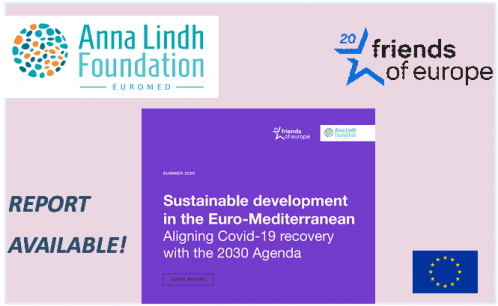Sustainable development in the Euro-Mediterranean - Aligning Covid-19 recovery with the 2030 Agenda

High-level policy insight debate on Euro-Mediterranean cooperation on Sustainable Development Goals and Covid-19 recovery
On July 2nd 2020, the Anna Lindh Foundation and Friends of Europe co-organised an online High-level policy insight to discuss the role of EU-MENA multilateral and collective action and of intercultural dialogue on the recovery of the Covid-19 pandemic in strengthening the implementation of the Sustainable Development Goals (SDGs) of the 2030 agenda, as well as to align short-term action with long-term cooperation.
More specifically, the discussion focussed on Goal 17 which seeks to strengthen global partnerships to support and achieve the ambitious targets of the 2030 Agenda, bringing together national governments, the international community, civil society, the private sector and other actors in the Euro-Mediterranean region through intercultural dialogue. In this regard, the Anna Lindh Foundation’s Executive Director, Dr Nabil Al Sharif, highlighted the various Foundation’s activities, including the ALF’s flagship Young Mediterranean Voices Programme, research and studies on intercultural trends in the region, in partnership with the network of Unimed universities, as well as partnerships with major international institutions.
“The Euro-Mediterranean must be at the core of EU policies”, highlighted Dr. Nabil Al-Sharif, Executive Director of the Anna Lindh Foundation, and reiterated the importance of key partnerships, “We must not allow Euro-Mediterranean development and cooperation to fall on the back-burner due to Covid-19.”
Dr. Nabil Al-Sharif has also underlined the Foundation’s involvement in supporting the implementation of 2030 SDGs. “Multilateralism is the only way to deal with this crisis” highlighted Dr. Nabil Al-Sharif and stated that Mediterranean integration is one of the key pillars in overcoming the crisis and should be seen as a new growth model and that only a real common political impulse to support and strengthen Euro-Mediterranean ties and partnerships will help us overcome this ordeal together.
In light of the findings of the UN Sustainable Development Solutions Network (UNSDSN) 2020 Sustainable Development Report on the implementation of SDGs, Angelo Riccaboni, Chair of UNSDSN Mediterranean, highlighted that Covid-19 has a short-term negative impact on most SDGs, which unfortunately are amplified for vulnerable groups. He stated that much progress is still to be done in the Euro-Mediterranean region in the areas of poverty, gender equality, obesity, unsustainable agricultural practices, internet access and digital divide. “On Euro-Mediterranean cooperation, we need to build bridges across both shores, especially on education”, noted Angela Riccaboni.
Anna Strzaska, Head of Department for Strategy and Instruments of the European Neighbourhood Policy at EEAS explained that, despite Covid-19, the EU is still actively engaged in third countries, notably through the Team Europe package. “Multilateralism is key when it comes to responding to Covid-19 and achieving the SDGs”, highlighted Anna Strzaska and explained that “the EU plans to host a discussion to rethink relations with the Southern Mediterranean and consult with partners to shape the Multiannual Financial Framework”.
Nona Deprez, Head of Unit for the Partnership Instrument for the European Commission’s Service for Foreign Policy Instrument (FPI), has confirmed that "The EU will not put partnerships on the back-burner because we are in this together". She added that the Team Europe initiative intends to bring together citizens, cities, governments, civil societies and businesses from the Euro-Mediterranean and abroad to achieve a new recovery deal between nature and people. “Building back better is a growth strategy, is fully aligned with the green transition, with the digital transition and brings us closer to the SDGs”.
The virtual debate also provided the opportunity for young leaders to share their views on the challenges of Covid-19 crisis. They have called for further cooperation and mutual support for youth ambassadors in the Euro-Mediterranean region, as well as for an action plan that creates long-term commitment to SDGs and stronger intercultural dialogue.
Dr. Nabil Al-Sharif concluded the debate by pointing out that there is still very strong potential for Euro-Mediterranean cooperation in terms of virtual communication to enhance opportunities of youth and to foster communication at the two shores of the Mediterranean.